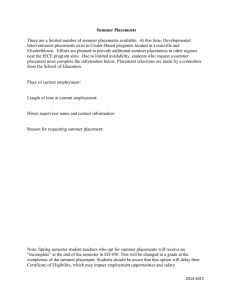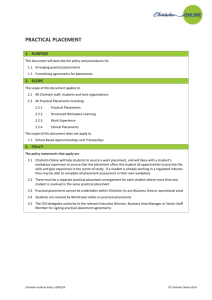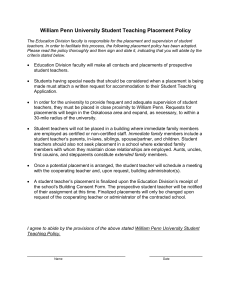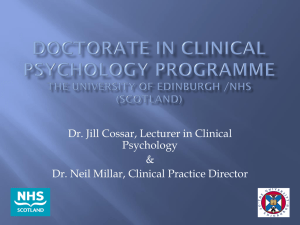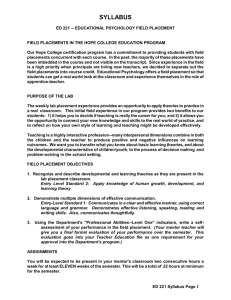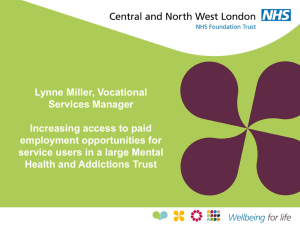Word 1.74MB - Department of Health
advertisement
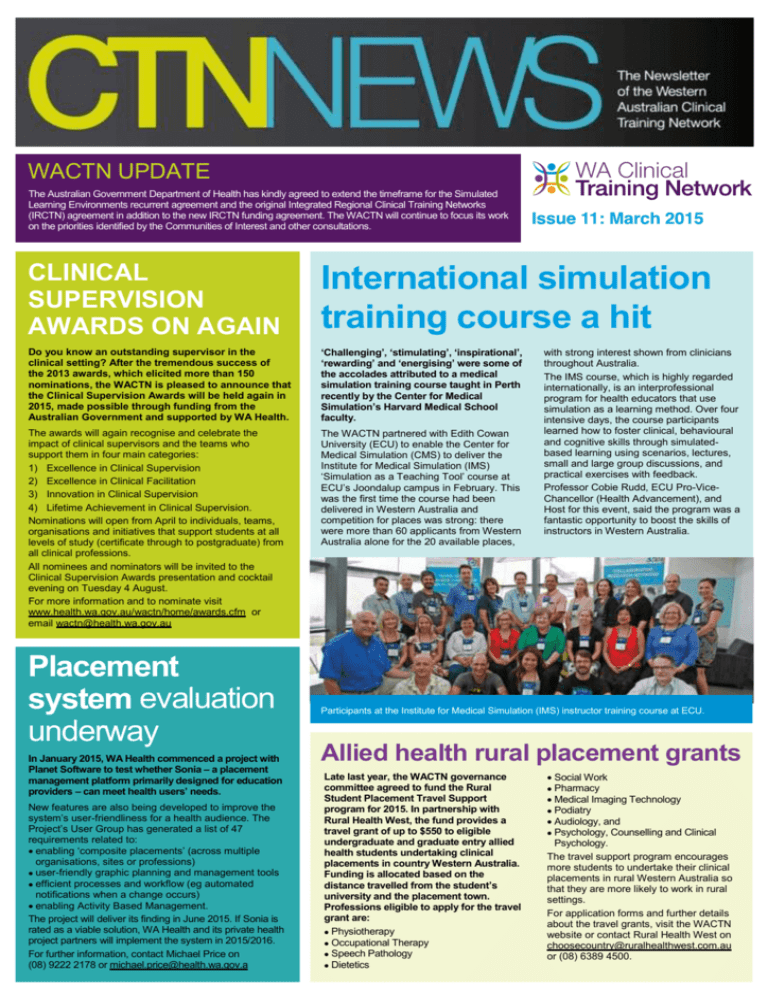
WACTN UPDATE The Australian Government Department of Health has kindly agreed to extend the timeframe for the Simulated Learning Environments recurrent agreement and the original Integrated Regional Clinical Training Networks (IRCTN) agreement in addition to the new IRCTN funding agreement. The WACTN will continue to focus its work on the priorities identified by the Communities of Interest and other consultations. CLINICAL SUPERVISION AWARDS ON AGAIN International simulation training course a hit Do you know an outstanding supervisor in the clinical setting? After the tremendous success of the 2013 awards, which elicited more than 150 nominations, the WACTN is pleased to announce that the Clinical Supervision Awards will be held again in 2015, made possible through funding from the Australian Government and supported by WA Health. ‘Challenging’, ‘stimulating’, ‘inspirational’, ‘rewarding’ and ‘energising’ were some of the accolades attributed to a medical simulation training course taught in Perth recently by the Center for Medical Simulation’s Harvard Medical School faculty. The awards will again recognise and celebrate the impact of clinical supervisors and the teams who support them in four main categories: 1) Excellence in Clinical Supervision 2) Excellence in Clinical Facilitation 3) Innovation in Clinical Supervision 4) Lifetime Achievement in Clinical Supervision. Nominations will open from April to individuals, teams, organisations and initiatives that support students at all levels of study (certificate through to postgraduate) from all clinical professions. All nominees and nominators will be invited to the Clinical Supervision Awards presentation and cocktail evening on Tuesday 4 August. For more information and to nominate visit www.health.wa.gov.au/wactn/home/awards.cfm or email wactn@health.wa.gov.au The WACTN partnered with Edith Cowan University (ECU) to enable the Center for Medical Simulation (CMS) to deliver the Institute for Medical Simulation (IMS) ‘Simulation as a Teaching Tool’ course at ECU’s Joondalup campus in February. This was the first time the course had been delivered in Western Australia and competition for places was strong: there were more than 60 applicants from Western Australia alone for the 20 available places, Placement system evaluation underway In January 2015, WA Health commenced a project with Planet Software to test whether Sonia – a placement management platform primarily designed for education providers – can meet health users’ needs. New features are also being developed to improve the system’s user-friendliness for a health audience. The Project’s User Group has generated a list of 47 requirements related to: enabling ‘composite placements’ (across multiple organisations, sites or professions) user-friendly graphic planning and management tools efficient processes and workflow (eg automated notifications when a change occurs) enabling Activity Based Management. The project will deliver its finding in June 2015. If Sonia is rated as a viable solution, WA Health and its private health project partners will implement the system in 2015/2016. For further information, contact Michael Price on (08) 9222 2178 or michael.price@health.wa.gov.a with strong interest shown from clinicians throughout Australia. The IMS course, which is highly regarded internationally, is an interprofessional program for health educators that use simulation as a learning method. Over four intensive days, the course participants learned how to foster clinical, behavioural and cognitive skills through simulatedbased learning using scenarios, lectures, small and large group discussions, and practical exercises with feedback. Professor Cobie Rudd, ECU Pro-ViceChancellor (Health Advancement), and Host for this event, said the program was a fantastic opportunity to boost the skills of instructors in Western Australia. Participants at the Institute for Medical Simulation (IMS) instructor training course at ECU. Allied health rural placement grants Late last year, the WACTN governance committee agreed to fund the Rural Student Placement Travel Support program for 2015. In partnership with Rural Health West, the fund provides a travel grant of up to $550 to eligible undergraduate and graduate entry allied health students undertaking clinical placements in country Western Australia. Funding is allocated based on the distance travelled from the student’s university and the placement town. Professions eligible to apply for the travel grant are: Physiotherapy Occupational Therapy Speech Pathology Dietetics Social Work Pharmacy Medical Imaging Technology Podiatry Audiology, and Psychology, Counselling and Clinical Psychology. The travel support program encourages more students to undertake their clinical placements in rural Western Australia so that they are more likely to work in rural settings. For application forms and further details about the travel grants, visit the WACTN website or contact Rural Health West on choosecountry@ruralhealthwest.com.au or (08) 6389 4500. Member Profile: Michelle Dillon The reconfiguration of the South Metropolitan Health Service (SMHS) and the opening of the new Fiona Stanley Hospital in Murdoch have seen major changes to services within SMHS. The 783-bed, state-of-the-art hospital is now the region’s major tertiary facility, absorbing a number of services from other hospitals and health facilities. As Area Director of Nursing and Midwifery for SMHS, Michelle Dillon has helped to drive these changes, reshaping the nursing and midwifery workforce to accommodate the shifts in location and service focus. At the same time, she led the development of a clinical placement system that has centralised undergraduate placement allocations for nurses, midwives and paramedics within SMHS. The system won the Clinical Training category of the 2014 WA Health Excellence Awards. “The project was prompted by the need to increase placements in some areas due to the downsizing of Royal Perth Hospital and Fremantle Hospital, and the simultaneous increase in placement demand from the education sector,” explains Michelle, a Registered Nurse with extensive experience in intensive care, education and management who has worked in the United Kingdom and India as well as on Australia’s east coast. “This process has culminated in many achievements including the endorsement of clear guidelines on the management of clinical placements; development of a standardised methodology for equitable allocation of students; strengthened relationships between the health and education sectors; and the development of the state’s first standardised student orientation and elearning package.” She said a database had also been developed that has captured some of the most reliable data on placement activity to date. This includes data on placement requests from individual education providers, demand for particular types of placements and rates of cancellations. This information is being used to ensure equitable access to placements by all education providers, not just those with the biggest student cohort. It is also helping to discourage the wastage of placement opportunities, with educators closely monitored through the system and penalties applied for last-minute placement cancellations. “The information on demand for particular types of placements is also very valuable,” added Michelle. “For example, the data has illustrated the particularly high demand for operating theatre and maternity placements. Embedding interprofessional learning in placements The qualitative review of interprofessional clinical placement opportunities in Western Australia has now been completed. The report, Embedding Interprofessional Learning in Placements in Service Delivery, aimed to explore the current status of Western Australian clinical placements and to gather specific qualitative information regarding interprofessional learning, and how such placements could be framed in health organisations. Through in-depth interviews with 19 health and disability teams in Western Australia and a review of current literature, four main recommendations were made to embed interprofessional learning in placements. The full report will be available on the WACTN website shortly. I can now plan the future workforce by ensuring that students have adequate learning opportunities in these areas and are work-ready for areas experiencing workforce shortages.” The database also captures peaks and troughs in demand for placements over time. This information can be used to encourage more placements during low-demand periods (such as Christmas and semester breaks), so that education providers get the placements they need and the variable workload on placement staff is evened out. POSITIVE FEEDBACK ON CLINICAL SUPERVISION TRAINING Feedback to date on the Clinical Supervision Training courses has been very positive, with many comments made about the value of their interprofessional nature and the quality of the interaction. Enrolment by profession (Figure 1) is consistent with previous clinical supervision training where nursing and allied health made up the bulk of the participants. Enrolments by sector (Figure 2), shows a small proportional increase in private and non-government organisation sectors compared with training provided in 2013. A formal evaluation of the skills initiative program is being conducted nationally by the Commonwealth Department of Health and is not yet complete for Western Australia. Initial data from the Clinical Supervision Training threemonth evaluation suggests that the training was valuable in helping health professionals to more successfully navigate the role of clinical supervisor. There is still capacity in the foundational and intermediate courses in Broome on 7 and 8 May. For more information, see the WACTN website or email wactn@health.wa.gov.au. Cultural Safety Training on offer Free Cultural Safety Training, delivered by the Aboriginal Health Council of Western Australia, will be offered by the WACTN in Highgate on Monday 11 May. The training is open to health professionals who currently (or soon will) provide clinical supervision or support for the clinical placements of Aboriginal Health Work students. Places are limited. Please contact the WACTN to register your interest on (08) 9222 2166 or wactn@health.wa.gov.au. Contact us WA Clinical Training Network Level 1, B Block 189 Royal Street EAST PERTH WA 6004 Web: http://www.health.wa.gov.au/wactn Email: wactn@health.wa.gov.au Telephone: (08) 9222 2166 or (08) 9222 2278
